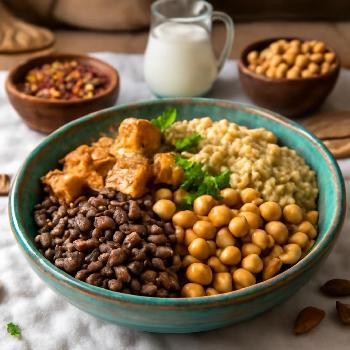Cooking Tips > Cooking for Special Diets > Vegan & Plant-Based > What are the best plant-based protein sources?
What are the best plant-based protein sources?
Discover the top plant-based protein sources to build a balanced and nutritious vegan diet. Learn about complete proteins, protein combining, and delicious ways to incorporate these foods into your meals. This guide provides practical tips and information to help you meet your protein needs while enjoying a plant-based lifestyle.

Understanding Protein in a Vegan Diet
Protein is essential for building and repairing tissues, producing enzymes and hormones, and supporting overall health. While meat is often considered the primary source of protein, many plant-based foods offer significant amounts of this vital nutrient. A well-planned vegan diet can easily meet your protein requirements.
Top Plant-Based Protein Sources
Legumes: Beans, Lentils, and Chickpeas
Legumes are nutritional powerhouses, providing not only protein but also fiber, iron, and other essential nutrients. They are also relatively inexpensive and easy to prepare.
Soy Products: Tofu, Tempeh, and Edamame
Soy products are among the best plant-based protein sources because they are complete proteins. They offer a wide range of culinary possibilities.
Nuts and Seeds: A Protein-Rich Snack
Nuts and seeds are convenient and nutrient-dense sources of protein and healthy fats. They are perfect for snacking or adding to meals.
Protein Combining (Optional)
The concept of protein combining (eating specific combinations of plant-based foods at each meal to ensure you get all essential amino acids) used to be emphasized heavily. However, current nutritional understanding indicates that as long as you consume a varied diet throughout the day, you don't need to meticulously combine foods at each meal. Your body can draw from an 'amino acid pool' to ensure it has what it needs.
Tips for Incorporating Plant-Based Protein
FAQ
-
Are plant-based proteins as good as animal proteins?
Plant-based proteins can be just as good as animal proteins, especially when you consume a varied diet that includes a mix of legumes, grains, nuts, and seeds. While some plant-based proteins are not complete (meaning they don't contain all nine essential amino acids), eating a variety of these foods throughout the day will ensure you get everything you need. -
How much protein do I need on a vegan diet?
The recommended daily allowance (RDA) for protein is 0.8 grams per kilogram of body weight. However, your protein needs may vary depending on your activity level, age, and overall health. Athletes and individuals with certain medical conditions may need more protein. Consult with a healthcare professional or registered dietitian for personalized recommendations. -
Is it possible to build muscle on a vegan diet?
Yes, it is absolutely possible to build muscle on a vegan diet. By consuming enough protein and engaging in regular strength training, you can achieve your fitness goals. Focus on incorporating protein-rich foods like tofu, tempeh, lentils, and quinoa into your diet.
